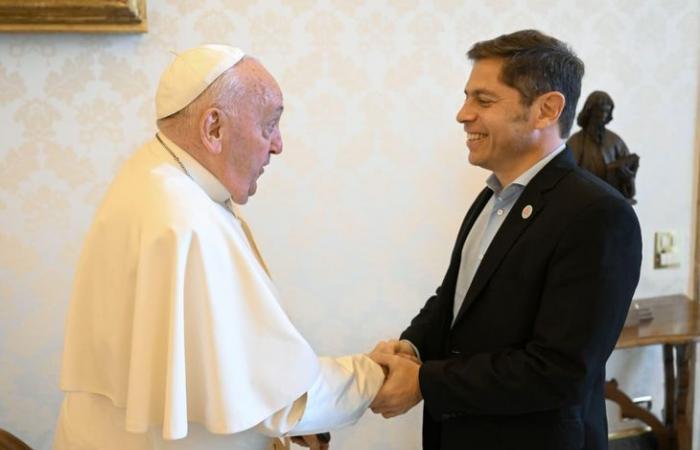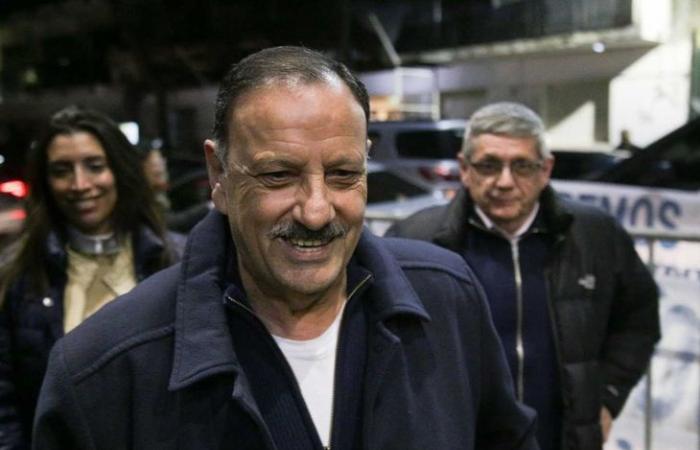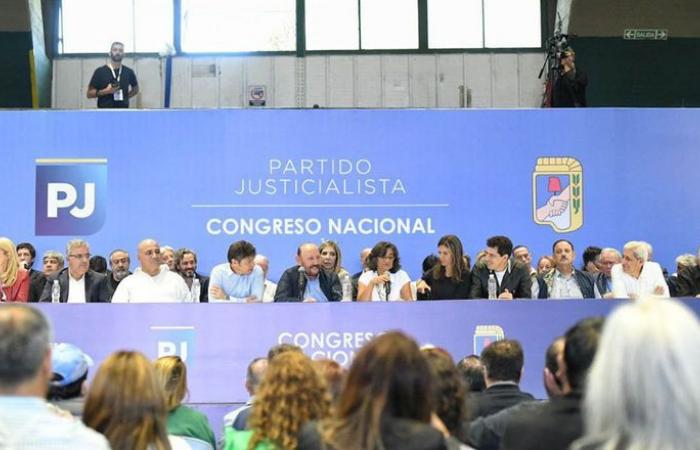Axel Kicillof prepares meetings with other PJ governors
Within that scheme, Axel Kicillof advances with the nationalization of his figure. On Tuesday, the former Minister of Economy coordinated a Buenos Aires scrum at the Treasury Palace, which included his entire cabinet and 60 Peronist mayors of the Province of Buenos Aires, who presented a petition addressed to the minister at the entrance table. Luis “Toto” Caputo. Later that day, at a press conference, the president stood in front of the group and offered details of the $6.3 billion that the district claims from the Nation in different owed items.
Although they consider that the orders will fall on deaf ears, In La Plata they highlight that it was a transcendent political event and that it served to put on the table the effects of Javier Milei’s Motosierra plan on the provinces.
A day later, Kicillof left for the Vatican where he held not only one, but two private audiences with Pope Francis, a symptom of the coincidence of diagnoses between both leaders regarding the Argentine reality. The governor brought various data to the pontiff about the situation, both national and Buenos Aires. “In some way we talk about the consequences of this Bases law,” the boss commented regarding the meetings.
Kicillof Pope Francis.jpg
Axel Kicillof met with Pope Francis this week in the midst of discussing the Bases law.
Upon his return, the economist will continue his political construction in allied territories. First, he will visit La Pampa, where he will meet with Sergio Ziliotto. Later he will be received in La Rioja by Ricardo Quintela. This last meeting would be, tentatively, on July 1, although there is still no exact date, as this media was able to find out. It’s not random. These are the three leaders of Unión por la Patria (UP) who show greater belligerence with the Casa Rosada.
Ziliotto is precisely another of the leaders who rears his head in the national PJ. Without the possibility of re-election, the governor boasts an orderly province and maintains his tough opposition to the libertarian administration. With less exposure than his Buenos Aires counterpart, the governor does not miss the opportunity to contrast his management with that of La Libertad Avanza (LLA) and establish himself as one of the leaders of the interior.
Embed – https://publish.twitter.com/oembed?url=https://x.com/ZiliottoSergio/status/1800647880564224336&partner=&hide_thread=false
After the session in Congress, the president came out with his hat on and assured that “for the finances of the provinces, the fiscal package will be as harmful as the Bases law for the country.” The provinces will continue to lose resources. Milei’s government will advance its objective of ‘merging the provinces’. As if this were not enough, the salary will pay profits again and the powerful will have less taxes,” he noted on his social networks.
In parallel, he attacked the governors who support the restitution of the fourth category of the Income Tax, since, as he considered, “The workers and the provinces lose.” It should be noted that Ziliotto is a member of the Patagonian League, which is especially sensitive to workers paying the tribute. Precisely the votes of the region’s senators were key for that particular article to be rejected. The Pampas management, in addition, demands $39 billion in debt from the Nation for different concepts.
quintela.jpg
“Quintela wants to work for the unit, he does not propose candidates,” local sources told this medium.
Finally, the Riojan Ricardo Quintela completes the triad of PJ governors at odds with the ruling party. Such is the tenor of his struggle with Nación, that he even issued the first quasi-currency of the Milei era: El Chacho. In the district they emphasize that the future meeting with Kicillof is part of the normalization process that the PJ is going through. “Quintela wants to work for the unit, he does not propose candidates,” Local sources told this medium about an eventual nomination of the boss to lead Peronism.
Lower on the radar, the Formoseño flies Gildo Insfran. Insfrán presides over the PJ Congress and, beyond being an omnipresent figure in the Justicialist party for at least thirty years, he does not have the national projection to lead a unifying adventure. The tough sector is completed with Fuegian Gustavo Melella. Although he belongs to FORJA, a coalition that makes up UP but does not have a Justicialist pedigree, Melella is part of the celestial league. The southerner has a limited arsenal at the national level, since none of the five deputies nor the three senators for the province respond to his leadership.
The situation of the Catamarcan is different. Raul Jalil, which garnered a good bond with the Casa Rosada. And although the Peronist senators from his province, Guillermo Andrada and Lucia Corpaccimaintained their negative votes for the Bases law and the Fiscal package, Andrada voted in favor of the Large Investment Incentive Regime (RIGI). The province has special interest in this item, since they believe that it will attract important mining projects.
For his part, the Tucumán Osvaldo Jaldo He left the UP orbit and heads his own script, which finds him as an ally of the Casa Rosada. The peculiarity is that none of the two PJ senators from the province voted in favor of either the Bases project or the fiscal package. These are Juan Manzur and Sandra Mendoza. Manzur, in particular, disputes the centrality of politics in Tucumán with the current president. The plot led to a game of meetings and disagreements between the two leaders.
The PJ will elect new authorities in November
In March, during a congress held at the Ferrocarril Oeste micro-stadium, Peronism began the path towards a new stage. First of all, he accepted his president’s request for leave, Alberto Fernandez. Immediately afterwards, he ordered the call for elections for November 17 and, given the acephaly and lack of consensus, he appointed a commission made up of the people of Buenos Aires to head the party. Axel Kicillof and Cristina Álvarez Rodríguez; Analía Rach Quiroga from Chaco; Juan Manzur from Tucumán; and Lucía Corpacci from Catamarca.
National Congress Justicialist Party March 2024.jpg

Photo: NA.
The next head of Justicialism must contain the different tribes, ranging from Kirchnerism to the ranks of governors and unions, including mayors and legislators. Furthermore, the perspective of Sergio Massa weighs heavily, as he moves outside the classic party structure but maintains influence over the designs of the space.
In this regard, the Minister of Development of the Buenos Aires Community, Andrés “Cuervo” Larroque, assured this week that he sees a competitive Peronism in the 2025 legislative elections and considered that, if unity is consolidated, they will be able to obtain between “35 and 40 %”.
“There cannot be fragmentation here, that is why we have an enormous responsibility. And the central thing is why, it is clear. I think that precisely what cannot happen is what happened to us in this recent stage, where I see problems, if you want. , even of political maturity”, The former campor player, who became Kicillof’s bishop, told Radio Con Vos.








